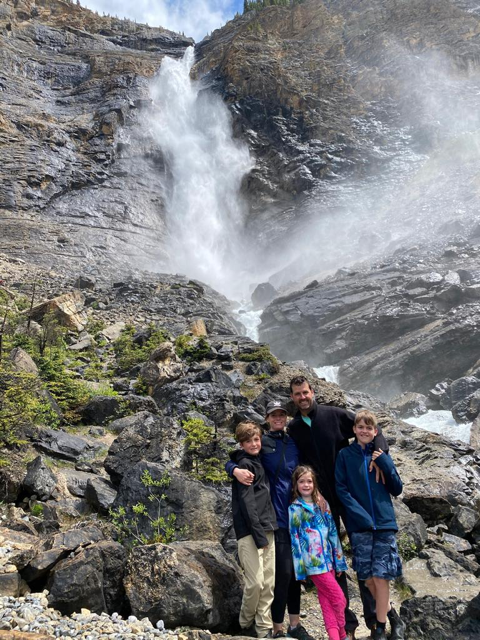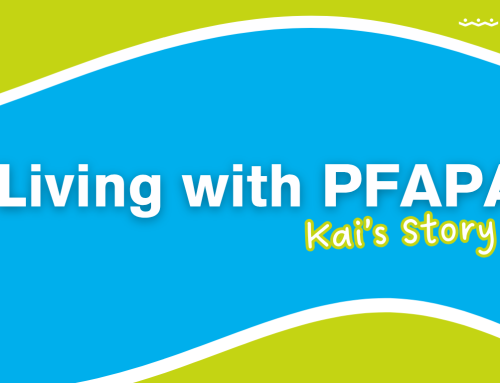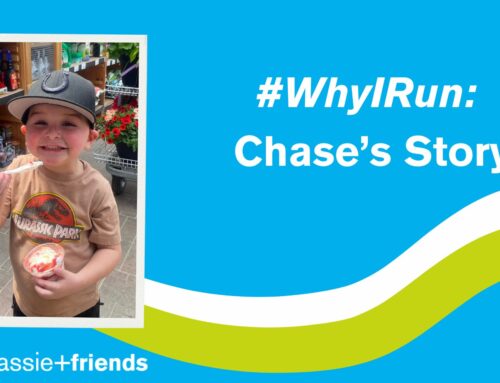He’s better than he has been…
Written by: Sara Ethier
“I wrote this piece to share my son’s journey of living with a rare, one in a million Autoinflammatory Disease.
Rare means that there is not a lot of research or treatment options available to children like my son who suffer. I appreciate the small steps forward when they come and am grateful for the medications available – even if they are so limited. If we’re lucky, a treatment could work indefinitely. Things have gotten better and right now he is on the best combination of medications to date.
One day, maybe my son will be cured. I wonder if there is someone looking to help my son or the other children who suffer from a rare disease like him. So we wait, we look to others for understanding, and we enjoy the good days.
I thank our doctor and nurses at the Alberta Children’s Hospital for their constant support, and Cassie + Friends for their efforts to create awareness and a community for those families dealing with TRAPS/CAPS/FCAS/PFAPA and other unspecified diagnoses.”
TRAPS came into our lives like a blast and a whisper.
It was a series of crises, emergency visits, 39.4-degree fevers, and an ambulance ride.
It was a subtle hint here or there, a spot on his skin, dark circles under his eyes, a loss of appetite.
It was all new to us and yet, over time, it was routine, almost predictable. We waited for the familiar signs – a certain look on his face, the fatigue, his small body curled up in the fetal position on the couch, his blanket tucked tightly underneath his nose.
That was when the fevers started. Not much else.
He was sick all the time with a virus. We had just moved to a small village outside of Paris. They said it must be the new germs he’s not used to. It’s mold in the house. It’s allergies, for sure. There are ticks in the area – have you heard of Lyme disease?
But that’s not what it was.
The sickness continued often enough that I knew something bigger was going on. Maybe it was a mother’s intuition. Was I being alarmist?
It’s a virus. That’s all it is.
Then it changed.
There was the pediatrician who barely spoke English. His practice was based out of a tiny third-floor apartment in a residential building not far from royal hunting grounds, maybe Louis XIV. The parking was atrocious and I was pregnant at the time.
“This is not a virus,” he said with concerned brown eyes. “Come see me. Come see me every time.”
After a while, he showed me.
I looked and I could see it – a pattern. It was so obvious.
“How could I have missed it?”
It was recurring fevers of no known cause every four-weeks. He was healthy in between.
He responded to steroids, if we wanted them. We saved them for the times when their side effects – volatility, anger, disrupted sleep, a rebound flare – were worth the reprieve. A birthday, vacation or school field trip.
One day, I noticed a small red spot on his hand. He started to drag behind on the walks to school. He was emotional.
The pediatrician ordered blood work revealing an abnormally high immunoglobulin level that confirmed what he was looking for. He referred us to a rheumatologist working out of a Versailles hospital. We drove past the palace often on route to our appointments, but stopped noticing the grandeur.
“It’s not the recurrent fever syndrome,” she said with a kind face. “There’s also a rash.” More bloodwork, some genetic testing.
“The results do not show us anything.”
We breathed relief.
“He does not have HIDs.”
Thank goodness.
“Clinically, he sits somewhere between CAPS and TRAPS.”
Oh.
We returned to Canada when our son started grade three. He became a patient at the Alberta Children’s Hospital. His flares grew in frequency, intensity and duration. His feet were so painful he could not walk. Hands too sore to hold a pencil. Hot red skin.
There was the flare after his grandpa passed away.
It lasted months, his face like death, he lost weight, his eyes bloodshot and grainy. It came back with a vengeance after prednisone. We waited for it to end, still not knowing what we were dealing with.
Five years in we got an official diagnosis of TRAPS. I don’t know when this all started. I remember that time he was sick as a toddler, they said it was a virus.
He missed out on a lot. We all did. Cancelled bike rides. Lost ski days. Anything involving walking. I couldn’t work.
Then it changed again.
The flares lasted longer but the fevers faded away. I don’t know when they stopped, the other symptoms took over. Red painful rash – is this cellulitis? It would disappear and move. The next day, it would settle somewhere else – a hip, hand or knee – the inflammation elusive.
More bloodwork, some genetic testing.
Winters were bad.
He crawled around the house like a baby. I would not be able to carry him much longer. He stayed home from school.
Then there was that afternoon. “Mom, would you trade me for a normal kid?”
At eleven. “My pain is like gunshots hitting a glass. At the end of the day, it breaks the glass. That’s when I give up.”
More recently. “I don’t know if I can put up with the pain.”
We’ve had dark moments and failed medications. This is the reality of living with a rare disease.
There is brightness.
Doctors and nurses we are grateful for. Supportive family and friends. Understanding teachers. Good neighbours. My son’s friend who selflessly changes bike-ride plans to sit and talk if that’s what is needed. Siblings who are learning empathy. That life is more difficult for some, that their brother did nothing to deserve this.
It’s not his fault. It’s not their fault. It’s not our fault.
We move forward.
We recognize how much harder our son has to work when he is flaring just to do normal things, like walk up the stairs, go to school, be with his friends.
We have a treatment plan, it’s not perfect but it’s the best we’ve had.
He’s much better than he has been.
TRAPS – or Tumor necrosis factor receptor-associated periodic syndrome – is a very rare inflammatory disease, most common in children, with an estimated prevalence of about one per million. On February 29th, 2024 we will be celebrating #RareDiseaseDay. Learn more about the types and prevalences of other Rare Rheumatic Disease by Clicking HERE.










[…] “We’ve had dark moments and failed medications. We recognize how much harder our son has to work when he is flaring just to do normal things, like walk up the stairs, go to school, be with his friends.” -Parent, Sara Ethier on her son who lives with TRAPS- a rare disease affecting one in one million people. Read her full, moving essay, “He’s much better than he has been” here. […]
Thanks For sharing. This app s so revealing. Thank you for the knowledge you are telling us here in Canada. We’re there to support each other. Thank you once again!!!
Thank you for sharing your story! This is the reason we need to bring families of children with auto-inflammatory diseases together in Canada- you need to get support from others, and we need your help in framing our research agendas.